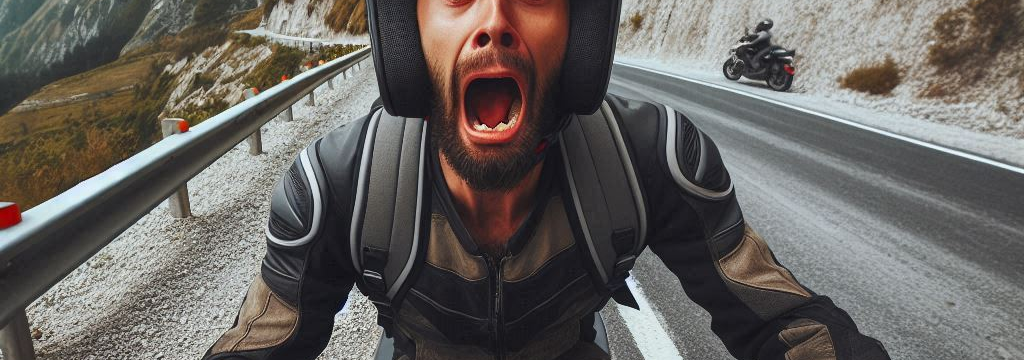
As a RiderCoach for the Beginner Rider Course, I occasionally experience a student who progresses well on day one but does not return for day two. Most of the time, an emergency forced them to cancel, and they would ask to come back on a future weekend. Sometimes, the drop-out never calls to reschedule; they just ghost the class. Why would they do that? It’s common to see a five-year-old bagger or sport bike with only 2,000 miles on the odometer. They paid $25K to $30K for a cool bike, why don’t they want to use it? Most riders have a favorite type of riding: countryside, adventure trails, winding mountain passes, etc. Some riders only ride a certain way every time. I knew people with Gold Wings who only rode to nearby restaurants with their friends. There is a common joke of fully outfitted GS bikes that only ride the path to the local Starbucks. This joke started with a few riders who never had an adventure outside their suburb. Why don’t they travel further? Too many riders maneuver their vehicles through the curves with stiff arms and a technique that would barely pass the beginner’s course. Both feet hit the pavement to paddle-walk through every parking lot. Why don’t they learn the skills to ride better? I believe the answer to these questions is fear.
Good Fear
Fear is not necessarily bad. It signals that we have reached the limits of skill or common sense. If zigzagging through heavy freeway traffic scares you, it’s too dangerous. If keeping up with your friend who rides on a suspended license and no insurance puts fear in you, that’s good. A fear of excessive risk will save your life. Riding fast, whether around a corner or a straight line, should be scary. It’s a preventive scare to trigger your self-preservation instincts and I hope we do not lose this fear.
I would argue that fear of losing your balance in a parking lot or fear of running off the road in a curve are good fears, but I categorize them as instructive fears. You should not hold onto these fears but realize that they are instructions to improve your skills. Controlling your bike at low speeds is not an excessively risky practice. Neither is maintaining your line at moderate speeds on a curvy road. Yet plenty of biker drop in a parking lot or run wide in a curve that would not make a blemish on a wide “chicken strip.” I’m talking about the accidents we have seen on YouTube that leave us wondering, “why did that happen?"
A fear of normal maneuvers is a call for training. A fear of risky behavior is a call to preserve your life. Heed these good fears that warn and instruct.
Bad Fear
In contrast to good fears that encourage safe riding, there are bad fears that encourage risk-taking. Peer pressure instills a fear of missing out or a fear of appearing weak. Only our egos have these fears and the greater the ego, the bigger the fear. Especially when we were young, we feared being afraid to keep up with risk beyond our abilities and common sense. Do you want to be the only member of your club who does not wheelie down Main Street on Saturday night? Are you afraid of being chicken? Before you claim that immaturity is long in your past, evaluate yourself honestly. Would you be embarrassed to admit that the infirmities of age limit you more than your peers? My ego fears the admission that my knee cannot handle standing on the pegs for that trail or that my hand and wrist have too much arthritis for fast riding. Would a fear of others viewing me as a weak old man make me try things that were difficult in my twenties? Egotistical fears have no redeeming value, and we must let go and abandon them.
Phobias
A phobia is an irrational fear like acrophobia, which I suffer from. I have leaned out of the cockpit of a 1920s era open biplane with no concern that the sputtering engine or fabric clad wings would fail to hold me up. However, if I walk to the rail of a third-floor balcony, my palms get sweaty and my knees wobble. This fear is illogical as I work at suppressing it on a mountain road. When I rode through the Alps, I concentrated on pushing this fear out of my head to concentrate on the line, turn-in point, and other vehicles. The phobia would send a twinge up my spine occasionally, but I countered with concentration and slower speeds. I was barely faster than the bicycles when I had to hug the cliff edge for oncoming cars. I was the slowest motorcyclist in the Alps, but I started to relax and enjoy the ride.
A phobia will erase our ego’s bad fears since it can be so strong. Egos surrender to the phobia while the latter is triggered. After the phobia has passed, the shamed ego may vow to embrace risky behavior next time, the mark of a bad fear. Moreover, the illogical phobia does not encourage any good benefits, like the desire to improve skill, so it is not a good fear. We must defeat our phobias or at least subjugate them under our control. I do not need to jump off roofs like Tom Cruise, just to not get sweaty palms on an Alpine pass.
Paralyzing Fear
In Harry Hurt's famous study of 900 accidents, he was shocked that a significant percentage of motorcyclists took no evasive action before a crash. Their fear paralyzed them into being a spectator to their own crash. Phobias can make this disconnect but even what I described as “good fears” can cause this result. Even if you realize your fear is a call to action, training or more practice, you might be too scared to try. You have a fear of failure. When I took Reg Pridmore’s CLASS Ride at the racetrack, I was disappointed that I was not running with the big dogs but whimpering with the little pups. Thankfully, I have failed often enough in my life to not fear the opinions of others. I learned and improved (still a long way to go). Even though I failed to achieve what I wanted to do, drag a knee on the track, nobody thought badly of me. The fear of failure came from inside me, not from the track or other riders. I could let it go so it could not stop me.
Overcoming Fear
We overcome fear through a series of small victories. Fear of U-turns? Practice in a parking lot with a couple of friends to observe and advise. Fear of running wide? Take a class from a professional trained to correct mistakes. Fear of dropping your bike in front of your friends? Dude, we have all done it and you probably saw us dropping it. It’s easy for someone to tell us to relax and stop worrying but it’s hard and requires a lot of small repetitive steps. Everything is scary the first time we do it, so do it again and again until the fear subsides. Because of a closed mountain pass, I rode the Col du Galibier twice on successive days. The first time, I was shaking more than the engine was vibrating. The second time, I was more relaxed, and the edge of the road was not as steep or threatening as before. I bet that if I rode it 3 or 4 more times, I would be relaxed enough to view the scenery.
Will Fear Make You Quit?
A lot of motorcyclists quit because of fear. Fear from a close call or accident can be too much to overcome. Many victims have a crash before coming to grips with how dangerous this passion is. Do not wait until then to look for and address your fears. Most fears can be overcome through training, practice, and repetition. Other fears can be too much; riding is not for everyone. Sometimes a person’s fear is so great that he does not get out of bed for the second day of the beginner class. The purpose of this essay is not to scare you or encourage you to continue a dangerous activity. I encourage you to identify your fears and figure out what they are telling you. If you have bad fears, change your behaviors. If you have good fears, improve your skills. “Ride safe” is not just a farewell term, it’s the goal of a long journey.


